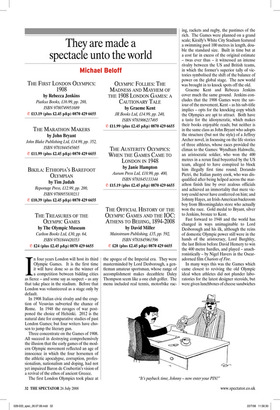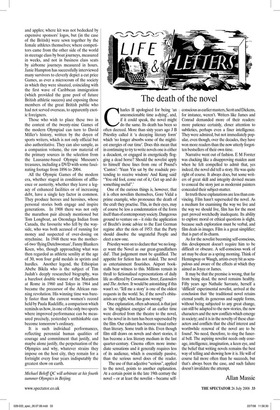They are made a spectacle unto the world
Michael Beloff
THE FIRST LONDON OLYMPICS:
1908
by Rebecca Jenkins Piatkus Books, £16.99, pp. 288, ISBN 9780749951689 V £13.19 (plus £2.45 p&p) 0870 429 6655 THE MARATHON MAKERS by John Bryant John Blake Publishing Ltd, £14.99, pp. 352, ISBN 9781844545605 V £11.99 (plus £2.45 p&p) 0870 429 6655 BIKILA: ETHIOPIA’S BAREFOOT OLYMPIAN by Tim Judah Reportage Press, £12.99, pp. 200, ISBN 9780955830211 V £10.39 (plus £2.45 p&p) 0870 429 6655 THE TREASURES OF THE OLYMPIC GAMES by The Olympic Museum Carlton Books Ltd, £30, pp. 64, ISBN 9781844420353 V £24 (plus £2.45 p&p) 0870 429 6655 OLYMPIC FOLLIES: THE MADNESS AND MAYHEM OF THE 1908 LONDON GAMES: A CAUTIONARY TALE by Graeme Kent JR Books Ltd, £14.99, pp. 240, ISBN 9781906217495 V £11.99 (plus £2.45 p&p) 0870 429 6655 THE AUSTERITY OLYMPICS: WHEN THE GAMES CAME TO LONDON IN 1948 by Janie Hampton Aurum Press Ltd, £18.99, pp. 400, ISBN 9781845133344 V £15.19 (plus £2.45 p&p) 0870 429 6655 THE OFFICIAL HISTORY OF THE OLYMPIC GAMES AND THE IOC: ATHENS TO BEIJING, 1894-2008 by David Miller Mainstream Publishing, £35, pp. 592, ISBN 9781845961596 V £28 (plus £2.45 p&p) 0870 429 6655 In four years London will host its third Olympic Games. It is the first time it will have done so as the winner of a competition between bidding cities as fierce – and some say as suspect – as any that take place in the stadium. Before that London was volunteered as a stage only by default.
In 1908 Italian civic rivalry and the eruption of Vesuvius subverted the chance of Rome. In 1948 the ravages of war postponed the choice of Helsinki. 2012 is the natural date for comparative studies of past London Games; but four writers have chosen to jump the literary gun.
Three concentrate on the Games of 1908. All succeed in destroying comprehensively the illusion that the early games of the modern Olympic movement reflected an age of innocence in which the four horsemen of the athletic apocalypse, corruption, professionalism, nationalism and doping, had not yet impaired Baron de Coubertin’s vision of a revival of the ethos of ancient Greece.
The first London Olympics took place at the apogee of the Imperial era. They were masterminded by Lord Desborough, a gentleman amateur sportsman, whose range of accomplishment makes decathlete Daley Thompson seem like a one club golfer. The menu included real tennis, motorbike rac ing, rackets and rugby, the pastimes of the rich. The Games were planned on a grand scale; Kiralfy’s White City Stadium featured a swimming pool 100 metres in length, double the standard size. Built in time but at a cost far in excess of the original estimate – twas ever thus – it witnessed an intense rivalry between the US and British teams, in which the former’s superior tally of victories symbolised the shift of the balance of power on the global stage. The new world was brought in to knock spots off the old.
Graeme Kent and Rebecca Jenkins cover much the same ground. Jenkins concludes that the 1908 Games were the saviour of the movement, Kent – as his sub-title implies – opts for the knocking copy which the Olympics are apt to attract. Both have a taste for the idiosyncratic, which makes their books enjoyable reads; but neither is in the same class as John Bryant who adopts the structure (but not the style) of a Jeffrey Archer novel, in focussing on the life stories of three athletes, whose races provided the climax to the Games: Wyndham Halswelle, an aristocratic soldier, who won the 400 metres in a rerun final boycotted by the US team, alleged to have conspired to block him illegally first time round; Dorando Pietri, the Italian pastry cook, who was disqualified after being helped across the marathon finish line by over zealous officials and achieved an immortality that mere victory could never have conferred on him; and Johnny Hayes, an Irish-American backroom boy from Bloomingdales store who actually won the race. Gold medal to Bryant, silver to Jenkins, bronze to Kent.
Fast forward to 1948 and the world has changed in ways unimaginable to Lord Desborough and his ilk, although the reins of domestic Olympic power still were in the hands of the aristocracy, Lord Burghley, the last Briton before David Hemery to win the 400 metre hurdles, and played – anachronistically – by Nigel Havers in the Oscaradorned film Chariots of Fire.
In many ways this was the Games which came closest to reviving the old Olympic ideal when athletes did not plunder laboratories for the latest designer steroids, but were given lunchboxes of cheese sandwiches and apples; where kit was not bedecked by expensive sponsors’ logos, but (in the case of the British) were sewn together by the female athletes themselves; where competitors came from the other side of the world in steerage class by boat journeys, measured in weeks, and not in business class seats by airborne journeys measured in hours. Janie Hampton has successfully interviewed many survivors to cleverly depict a cut price Games, as ever a microcosm of the society in which they were situated, coinciding with the first wave of Caribbean immigration (which provided the gene pool of future British athletic success) and exposing those members of the great British public who had not served overseas, to apparently exotic foreigners.
Those who wish to place these two in the context of the twenty-nine Games of the modern Olympiad can turn to David Miller’s history, written by the doyen of sports writers, which is not only official but also authoritative. They can also sample, as a companion volume, the raw material of the primary sources in the selection from the Lausanne-based Olympic Museum’s treasures, including a DVD with some fascinating footage from 1896 to 2004.
All the Olympic Games of the modern era, whether staged in conditions of affluence or austerity, whether they leave a legacy of enhanced facilities or of increasing debt, have a single key factor in common. They produce heroes and heroines, whose personal stories both engage and inspire generations. In 1908 there was not only the marathon pair already mentioned but Tom Longboat, an Onondaga Indian from Canada, the favourite who fell by the wayside, who was both accused of running for money and suspected of over-dosing on strychnine. In 1948 there was the motherof-two ‘flying Dutchwoman’, Fanny Blankers Koen, who, though approaching what was then regarded as athletic senility at the age of 30, won four gold medals in sprints and hurdles. Another legend, the Ethiopian Abebe Bikila who is the subject of Tim Judah’s deeply researched biography, was a barefoot double winner of the Marathon at Rome in 1960 and Tokyo in 1964 and became the precursor of the African running revolution. His winning time was barely faster than the current women’s record held by Paula Radcliffe, a comparison which reminds us how, in one of the only two sports where improved performance can be measured precisely, yesterday’s unthinkable can become tomorrow’s ordinary.
It is such individual performances, reflecting perennial human qualities of courage and commitment that justify, and maybe alone justify, the perpetuation of the Olympics and why, whatever strains they impose on the host city, they remain for a fortnight every four years indisputably the greatest show on earth.
Michael Beloff QC will arbitrate at his fourth summer Olympics in Beijing.



























































 Previous page
Previous page